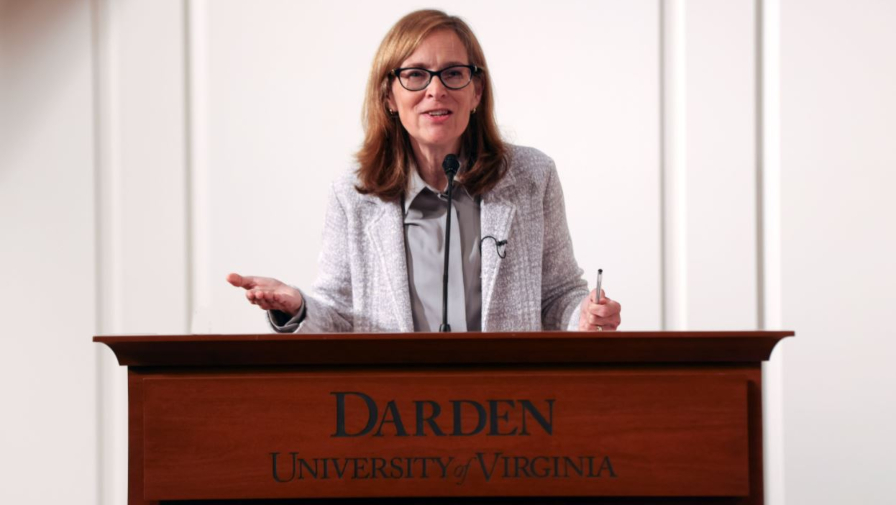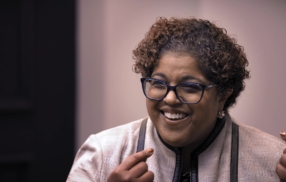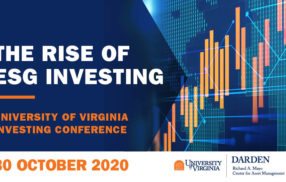
UVIC 2021: What’s Next for Investors in a Post-Pandemic World?
By Jen A. Miller
The COVID-19 pandemic has ushered in dramatic changes in individual daily lives. It has affected businesses, too — the way they work, the way they invest, and the way they think about creating a more resilient, healthy and equitable world. For investors, the considerations are numerous as they seek to adjust strategies to the new reality.
That’s also why the 2021 University of Virginia’s Investing Conference (UVIC) focused on the theme, The Road Ahead: Investing Following a Global Pandemic. Held virtually by the Richard A. Mayo Center for Asset Management at the Darden School of Business, UVIC featured leaders in finance, venture capital (VC) and technology from around the world who shared insights on what’s changed already and what will change in the future.
From Unicorns to Decacorns: the VC Explosion
After a keynote by Amity Shlaes, author of Great Society: A New History, Ian Ratcliffe (MBA ’94), managing partner at Sands Capital Ventures, talked about how the VC landscape has evolved.
Session moderator, Professor Elena Loutskina, noted that venture capitalists have seized on changes in the economy, business and society to capture “tremendous returns not seen since the late ’90s.”
Ratcliffe has watched those changes during his career. He noted the unprecedented pace of innovation — especially in technology and life sciences — that is driving the rapid growth of companies.
Life sciences tools and technologies funded by venture capitalists have “come to fruition and become really useful,” he said. Technologies like CRISPR, which allows for gene editing and cancer immunotherapy treatments, enabled “enormous value creation, which has then been recycled back into the industry.”
The immense profitability of VC investments in “unicorns” — privately held startup companies valued in excess of $1 billion — have enabled VCs to, in turn, pour money into the next generation of promising technologies.
Even the idea of unicorns is “rather a foolish term now,” Ratcliffe said, because there are now 109 of them with an aggregate market cap of $2.2 trillion. He expects their value to exceed the aggregate Russell 2000 Growth Index Market Cap of $2.4 trillion in the near future. “Plenty of those companies are decacorns,” Ratcliffe said. “It’s a big change.”
VC investments are also happening later in a company’s lifecycle, which means larger valuations for IPOs, a trend that started in 2018, he said. IPOs are coming after companies have already “scaled and commercialized and perhaps made their companies profitable long before they’re in the public markets.”
The flip side of high returns, and more kinds of investors investing money through VC, is competition. “One of my colleagues describes getting access to the hottest deals now as a knife fight,” he said.
Ratcliffe believes the next 10 years will be “the golden age of the biotechnology and life sciences industry.”
“That’s where the money is currently going,” he said.
He also expects new tech hubs outside of Silicon Valley — Nashville, Tennessee, and Austin, Texas, in the U.S., and Berlin and London, which have become “hot beds of technology investing” in Europe — to keep growing, especially since companies proved during the pandemic that most people who aren’t physically working in a lab can work from almost anywhere.
Ratcliffe believes that the best places for graduates to go if they want to work in the VC world are startups, so they can “understand how the business you’re going to invest in works from the inside,” he said. He also recommended consulting firms that do due diligence for venture funds. “They’re able to spool up really good stuff in a week, which is quite remarkable,” said Ratcliffe.
Cryptocurrency and Crypto-Native Investing
The conference’s closing panel looked at how cryptocurrency, blockchain and other fintech technologies could disrupt how banking is done, and the opportunities they’ve created for investors.
“It’s safe to say at this point that blockchain technology and cryptocurrency are becoming a very sizeable market that’s very hard to ignore,” said Caitlin Fitzmaurice (MBA ’11), managing director of the University of Virginia Investment Management Company (UVIMCO).
Avichal Garg, co-founder of Electric Capital, an early stage venture firm focused on cryptocurrencies, blockchain, fintech and marketplaces, said that we are in the AOL and Yahoo stage of cryptocurrency today. “It’s probably a 20- to 30-year transition, and we are in the very early innings of it.”
Nate Conrad, global head of asset management and head of mining services at NYDIG, said that while bitcoin’s market cap of $1 trillion dollars might seem like a lot, it’s not when compared to other sizeable markets of money in the world today, like gold or government-issued currency. Bitcoin still has a long way to grow, he said.
In terms of investing, traditional investment firms are colliding with crypto-natives, said Atul Rustgi, partner at Accolade Partners, a crypto-focused fund of funds. “When we started looking at this space five years ago, there were only a handful of firms dedicated to cryptocurrency,” he said. Now there are 200 dedicated solely to cryptocurrency, and they’re crypto-native, meaning they’re not tied to a generalist firm, he said, adding that almost all the crypto-focused partners from top generalist firms have spun out their own funds.
Garg expects the next two to five years to be “really interesting,” pushed along by “killer apps” using blockchain to do things we don’t know is possible right now. He likens it to when the GPS capabilities of a smartphone went from supporting apps that could give you directions to move you from point A to point B (Waze, Google Maps), to apps that could bring things to you, like cars (Uber and Lyft) and food (Doordash and Grubhub).
“We can do this new thing that we were never able to do before. It’s something worth a trillion dollars, and it surprised you because it wasn’t even possible to do that in the real world,” he said.
For cryptocurrency to truly be disruptive, it still needs more users and to “be more accessible by the masses,” said Rustgi. “It used to be crypto-natives. Then crypto-enthusiasts. But when will all my friends use it? When will my family use it? That will come with time, and as more financial institutions embrace bitcoin and blockchain instead of fighting the disruptive nature of it.”
“Think of early adopters of email sending email by command line and then Gmail comes out, and phew,” said Conrad. “Watch how these technologies come into the world over the next decade.”
View recordings of sessions from this year’s event, including discussions on the changing VC landscape, opportunities for investing in Asia-Pacific, the impact of global liquidity and the rise of decentralized finance.
The University of Virginia Darden School of Business prepares responsible global leaders through unparalleled transformational learning experiences. Darden’s graduate degree programs (MBA, MSBA and Ph.D.) and Executive Education & Lifelong Learning programs offered by the Darden School Foundation set the stage for a lifetime of career advancement and impact. Darden’s top-ranked faculty, renowned for teaching excellence, inspires and shapes modern business leadership worldwide through research, thought leadership and business publishing. Darden has Grounds in Charlottesville, Virginia, and the Washington, D.C., area and a global community that includes 18,000 alumni in 90 countries. Darden was established in 1955 at the University of Virginia, a top public university founded by Thomas Jefferson in 1819 in Charlottesville, Virginia.
Press Contact
Molly Mitchell
Senior Associate Director, Editorial and Media Relations
Darden School of Business
University of Virginia
MitchellM@darden.virginia.edu





